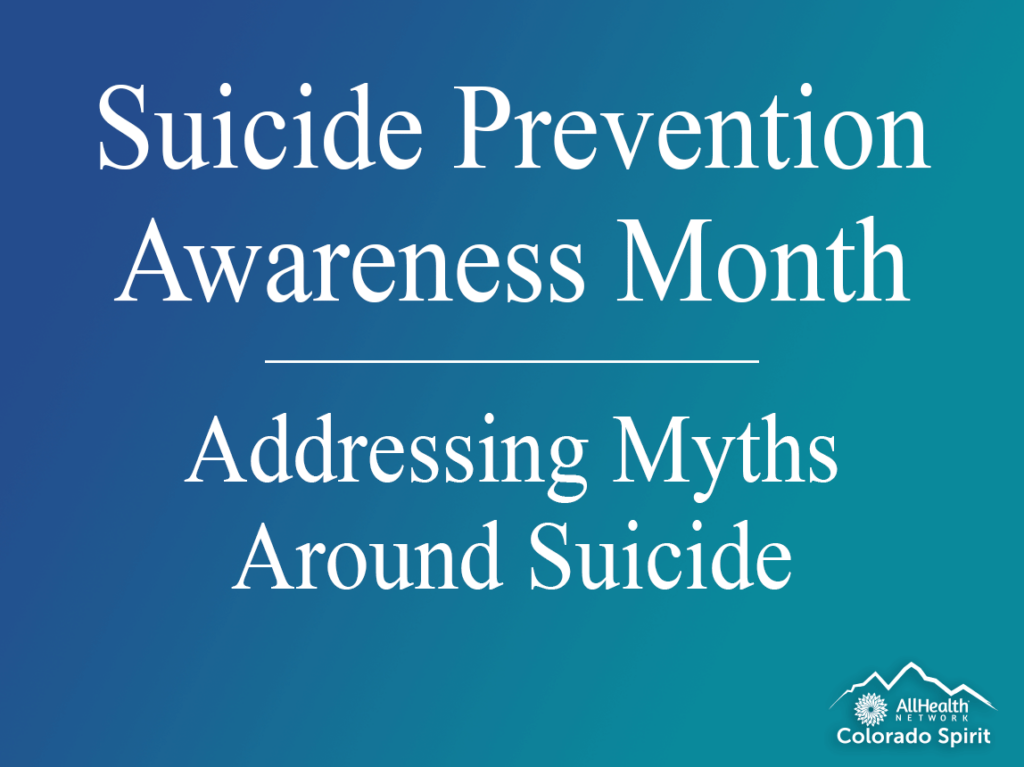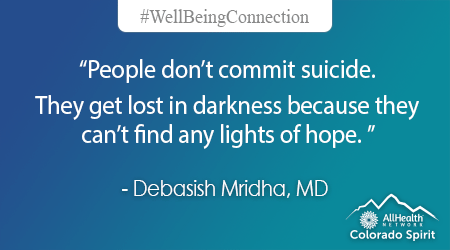We appreciate Colorado Spirit Counselors, Ivette Ceballos and Chelsea Nibert, for their work writing this post! We also thank Jennifer Morris, LPC, and Stephanie Asch, LPC, LAC, for their review and feedback!
Together, we can all help prevent suicide. Every year mental health organizations and individuals across the U.S. and around the world raise awareness for suicide prevention during September, National Suicide Prevention Awareness Month.
This week we want to address some of the myths around suicide that might get in the way of us having conversations with people we know.
Myth: People who talk about suicide are not serious and will not go through with it.
- Those who die by suicide often tell someone that they do not feel life is worth living, that they have no future, or that they want to die. It is important to always take someone seriously if they talk about feeling suicidal. Providing support and connecting those at risk of suicide to resources could help save their life. Loved ones can be reluctant to discuss suicide because they don’t understand the risk and have a misperception of “attention seeking.” Talking about suicide will not increase risk of suicide. The reality is that when someone verbalizes thoughts of suicide, they do need attention and support!
Myth: If a person is serious about killing themselves then there’s nothing you can do.
- Suicide can be prevented. We can intervene. Suicidal crises can be relatively short-lived. Immediate practical assistance such as staying with the person, encouraging them to talk, and helping them build plans for the future are all supportive responses that help people move through a crisis.
Myth: You have to be mentally ill to think about suicide.
- 1 in 5 people have thought about ending their life at some point. Not all who die by suicide have a diagnosed mental health concern
Myth: People who are suicidal want to die.
- The majority of those who feel suicidal do not actually want to die; they do not want to live the life they have. The distinction may seem small but is very important. It is why talking through other options at the right time is so vital.
Myth: Talking about suicide is a bad idea as it may give someone the idea to try it.
- Talking about suicide not only reduces the stigma, but also allows individuals to seek help, rethink their opinions, and share their story with others. Research shows that asking someone if they are thinking about suicide will not put the thought in their head or drive them to action.
Hopefully this information has helped send the message that talking to people about how they are doing is never a bad idea! The Suicide Prevention Coalition of Colorado shared this advice in their June news, “An easy first step to take is by simply asking someone ‘How are you?’ and spend the time to not only listen but hear their response.” We could not agree more!
An easy first step to take is by simply asking someone ‘How are you?’ and spend the time to not only listen but hear their response.
We know it is not always easy to know what to do and say when you are worried about someone. Our next post will have some suggestions of ways to be a support to others. We also recommend you consider taking a training to increase your comfort level. There are many trainings offered on suicide prevention that address more myths and give us practical tools to support the people around us if we are worried about them. Many of these trainings are offered online and are free of charge. AllHealth Network is offering several free trainings over the coming months that might be helpful.
- QPR (Question, Persuade, Refer) Suicide Prevention trainings. Click here for more details and to sign up .
- MHFA (Mental Health First Aid) trainings. Click here for more details and to sign up .
If speaking to someone would help, please reach out.
AllHealth Network provides several supports:
- To speak with someone in the Colorado Spirit Program about stress related to the pandemic, please call 720-707-6789 or visit our webpage at allhealthnetwork.org/Colorado-Spirit
- For information about other services at AllHealth Network or to get connected with ongoing behavioral health support, please call 303-730-8858. AllHealth Network is continuing to provide service via telehealth or by phone and our Crisis Walk-in Center remains open 24/7.
If you are experiencing a mental health crisis and are in need of immediate assistance, please call the Colorado Crisis Hotline at 1-844-493-8255 (TALK) or text TALK to 38255.
How do you know if you’re experiencing a mental health crisis? Click here to learn about mental health crisis warning signs to look out for from the National Alliance on Mental Illness (NAMI) .
Resources:
- https://www.nami.org/Blogs/NAMI-Blog/September-2020/5-Common-Myths-About-Suicide-Debunked
- https://suicideprevention.nv.gov/Youth/Myths/
- https://www.nimh.nih.gov/health/publications/suicide-faq
- This 2-minute video shares more details about MHFA https://youtu.be/1V63VjoTaNM
See a previous blog post:
Thinking About Suicide Prevention Awareness Month During a Pandemic



